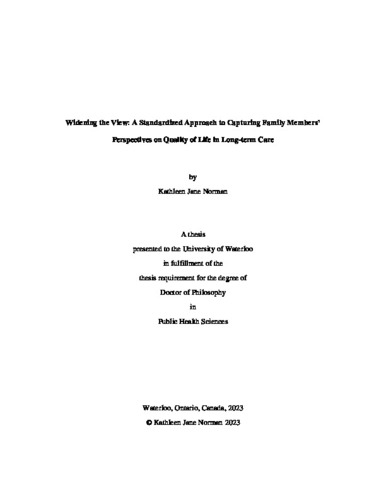| dc.description.abstract | Background and Rationale: Family members provide important functional and socio-emotional support to residents living in Long-Term Care (LTC). With high rates of cognitive impairment among residents, family member input is increasingly valued in new LTC standards provided by Health Standards Organization (HSO), given their unique perspectives, knowledge, and role in the resident’s circle of care. A standardized instrument to collect this input is lacking in the current literature.
Methods: A scoping review was conducted to gather and evaluate the existing literature studying the instruments used to evaluate family perspectives on Quality of Life (QoL) in LTC. This and retrospective analyses of secondary data collected from 3 previous studies using the interRAI Family QoL LTCF instrument (FamQoL V1), informed the development of a new instrument, the interRAI Family QoL LTCF Version 2 (FamQoL V2). An expert panel participated in the Delphi method to gather expert input into the development of a Version 2 interRAI Family QoL-LTCF (FamQoL V2) Instrument, through the Seniors Quality Leap Initiative (SQLI). Primary data were then collected from 38 LTC homes in Canada and the US with a total of 716 unique family members responding. These data were used to examine the psychometric properties of the instrument, develop summary scales, and examine distributions of Family QoL perspectives in North American LTC homes.
Results: The previously published instruments varied considerably with item counts ranging from 21 to 104 and 4 to 15 summary domains. While several common item themes were identified (e.g., living environment, resident care, autonomy, security, global recommendations), others were less consistent among the instruments (e.g., administration, admission process, therapies). Family members had lower positive response rates on the items with higher missing or non-response rates (e.g., bath/shower when wish, affection and romance, social activities). They scored higher than residents on items related to staff responsiveness and trust and lower than residents on items related to social life and personal control. Several Delphi rounds were conducted to build consensus, resulting in a 25-item FamQoL V2 instrument with 12 shared QoL-LTCF and 13 unique FamQoL V2 items. The instrument had strong performance. Five summary scales were developed through factor analysis, with Cronbach’s alpha ranging from 0.88 to 0.92.
Conclusion: This dissertation provides actionable evidence that supports the Quadruple Aim of Healthcare Improvement, meeting new national LTC standards, and assisting LTC homes in their quality improvement efforts. Through an extensive scoping review, analysis of a large and multi-study secondary dataset, expert Delphi input, multi-country primary data collection and psychometric testing, and family member feedback, a FamQoL V2 instrument was developed and accepted by a large consortium of LTC providers and researchers (SQLI). The instrument is operationally feasible, with a shorter number of items compared to other surveys and interoperability with other interRAI instruments. The scientific work underlying this instrument’s development has been reviewed and approved by interRAI’s Instrument and Systems Development (ISD) Committee and the FamQoL V2 is now included in interRAI’s published manual for QoL measures. An evidence-informed, reliable instrument is now available for jurisdictions to standardize how this important perspective is collected and measured in LTC. | en |

